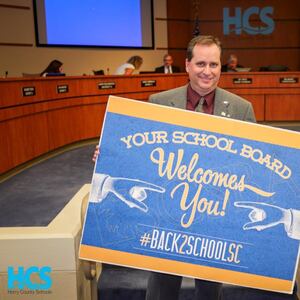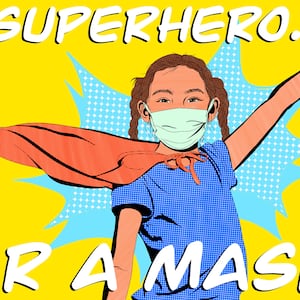Coronavirus infections are on the rise. Vaccination rates are lagging. Hospitals are filling up—and so are morgues. And yet a stubborn, right-wing governor not only refuses to take action to limit the virus’ transmission, he’s actively battling local authorities trying to protect their own communities.
No, this isn’t Florida or Texas we’re talking about. It’s another Republican-led Southern state suffering a devastating summer COVID-19 surge: South Carolina.
But as in Florida and Texas, communities in South Carolina are fighting back. Cities and school boards are advancing mask mandates in open defiance of the state government—and counting on courts to endorse their resistance on constitutional grounds.
The legal battle is likely to intensify as infections, hospitalizations, and deaths—fueled by the deadly combination of the Delta variant and the beginning of the school year—continue to increase, experts said.
“The current surge is likely to get worse in the weeks ahead,” Anthony Alberg, a University of South Carolina epidemiologist, told The Daily Beast.
The numbers don’t lie. After a brief reprieve this spring, the pandemic is nearly as bad as it’s ever been in South Carolina. The state, population 5 million, registered 6,783 confirmed and probable new infections on Wednesday—just shy of the record of 7,681 confirmed and probable cases on Jan. 6.
As of Sunday, 2,180 South Carolinians were hospitalized with severe COVID, compared to a single day record 2,453 that was reported Jan. 12. The state’s hospitals were at 82 percent capacity and climbing as of Sunday. In all, the SARS-CoV-2 pathogen has killed 10,562 people in the Palmetto State. South Carolina hospitals reported 214 COVID deaths last week.
That’s still well below the state’s worst week for deaths back in January, when 520 people died. But the worst is almost certainly yet to come, as we have seen in every state throughout the pandemic.
“With a surge like this, there is a lag period between when the cases develop, when the hospitalizations rise, and then when the deaths accumulate,” Alberg explained.
It’s not hard to see how South Carolina got this bad.
Yes, every state is grappling with the Delta variant and the inevitable, vulnerable crowds resulting from schools opening. Remember, the U.S. Food and Drug Administration has yet to OK Americans under the age of 12 to get vaccinated for COVID-19.
Every state is seeing an increase in COVID cases. But some of the states that are suffering the worst—Texas, Florida and, yes, South Carolina—have at least two things in common.
One is low vaccination rates, especially among younger residents. The other: right-wing governors and legislators who are working overtime to ban basic public-health practices such as mask and vaccine mandates.
South Carolina Gov. Henry McMaster, a Republican and early supporter of former President Donald Trump, has been fighting local officials and health experts since the early days of the pandemic. During the first spike in infections back in March 2020, McMaster refused to issue a statewide mask mandate or close businesses.
The state’s major cities of Columbia and Charleston began implementing social-distancing measures on their own late that March, mandating masks, closing bars and restaurants, imposing curfews, and limiting public gatherings.
McMaster’s administration—and its allies in state government—tried to stop them. “We affirm that local government cannot exercise the emergency powers delegated to the governor by the general assembly,” Attorney General Alan Wilson announced on March 27, 2020. (The general assembly is South Carolina’s state legislature.)
Columbia Mayor Steve Benjamin, a Democrat, brushed off the threat of a lawsuit from the state back then. “The actions taken by the city are entirely within our authority,” he said at the time.
McMaster eventually backed down. And for the better part of a year, South Carolina’s cities—as well as some of its counties and school districts—led the state’s efforts to mitigate COVID.
In the meantime, McMaster caught COVID-19 himself—and recovered.
When McMaster showed up again in force on the pandemic control front, this May, it was to sign off on a flurry of executive orders and budget measures banning mask mandates by local governments and school districts. The governor’s May order also banned “vaccine passports,” which are being rolled out in cities like New York.
Neither McMaster’s office nor the state health agency that works for him responded to requests for comment for this story.
The state efforts to roll back local public health measures came at the nadir of COVID in South Carolina. Vaccines were available. Schools were out. Delta had yet to appear. “We must move past the time of governments dictating when and where South Carolinians are required to wear a mask,” McMaster said. “Maintaining the status quo ignores all of the great progress we’ve made.”
That progress came to a screeching halt, and then reversed, when Delta showed up in South Carolina a few weeks later. Now, as before, the state’s cities, counties, and school boards are trying to contain the virus. And they’re doing so in defiance of McMaster’s orders and, arguably, state law.
The Columbia-based University of South Carolina, which with more than 27,000 undergrads is the biggest university in the state, fired first. Harris Pastides, a trained epidemiologist who is now the university’s interim president, issued a mask mandate in late July.
The Columbia city council followed up UofSC’s mandate with its own rule requiring school districts in city limits to mask up staff and students. It was the city’s “moral and ethical obligation” to require masks, Benjamin said. (Benjamin did not respond to a request for comment.)
Richland County, where Columbia is located, backed up the city’s school mask mandate with an identical mandate of its own. “I will admit that county council is not usually in the business of creating policies for schools,” Allison Terracio, a council member, told The Daily Beast. “However, in this case, we needed consistency across all schools in the county in regards to masking.”
With local governments providing cover, the boards of some of the state’s biggest school districts also voted in favor of masks. Molly Spearman, the state education superintendent, called on the legislature to rescind its anti-mask budget measure.
Three months after McMaster’s legal assault on public health, masks were back in the Palmetto State. The feds even weighed in: U.S. Secretary of Education Miguel Cardona wrote a letter backing up Spearman, while the U.S. Justice Department on Monday announced an investigation of South Carolina and other states that ban masks in schools, on the grounds that the bans violate the civil rights of at-risk students.
But Republicans in the state weren’t done fighting public health. Attorney General Wilson penned a letter to UofSC threatening to withhold state funds from the university. Wilson’s office did not immediately respond to a request for comment.
Pastides backed down, only to reinstate the mask mandate a few days later after the state Supreme Court, in response to a lawsuit from a UofSC professor, cleared the university to require masks.
The court handed down its ruling just days before students started arriving for the fall semester.
“We were pleased that the S.C. supreme court decision clearing the way for required face coverings came prior to the beginning of classes,” university spokesperson Jeffrey Stensland told The Daily Beast.
But rather than backing down, Republicans doubled down. Wilson sued Columbia. At the same time, a Richland County school district sued the state to block the mask ban. The Supreme Court began hearing arguments on both cases on Tuesday.
The stakes couldn’t be higher. South Carolina is a conservative state with a huge rural population and low educational attainment. Unsurprisingly considering these markers, it’s also lagging in vaccine uptake. Forty-three percent of South Carolinians are fully vaccinated, compared to 52 percent nationwide.
“There has to be a lot of fear, mistrust, and more for people to not want to get shots that could save their lives, help to protect their loved ones and their community, and help to get us out of this pandemic,” Alberg said. “We need to continue to seek ways to earn trust and overcome these barriers.”
Unless and until that happens, South Carolina is highly vulnerable to Delta and whatever future variants the virus spawns.
But it’s possible South Carolina, along with Texas and Florida, is also a bellwether.
Cities, counties, and school boards in all three states are defying their governors and legislatures and mandating masks and other public-health measures. As infections spike all over the United States, local defiance in favor of masks, vaccines, and social distancing could become more widespread.
And if the legal system backs them, that defiance might even save some lives.








